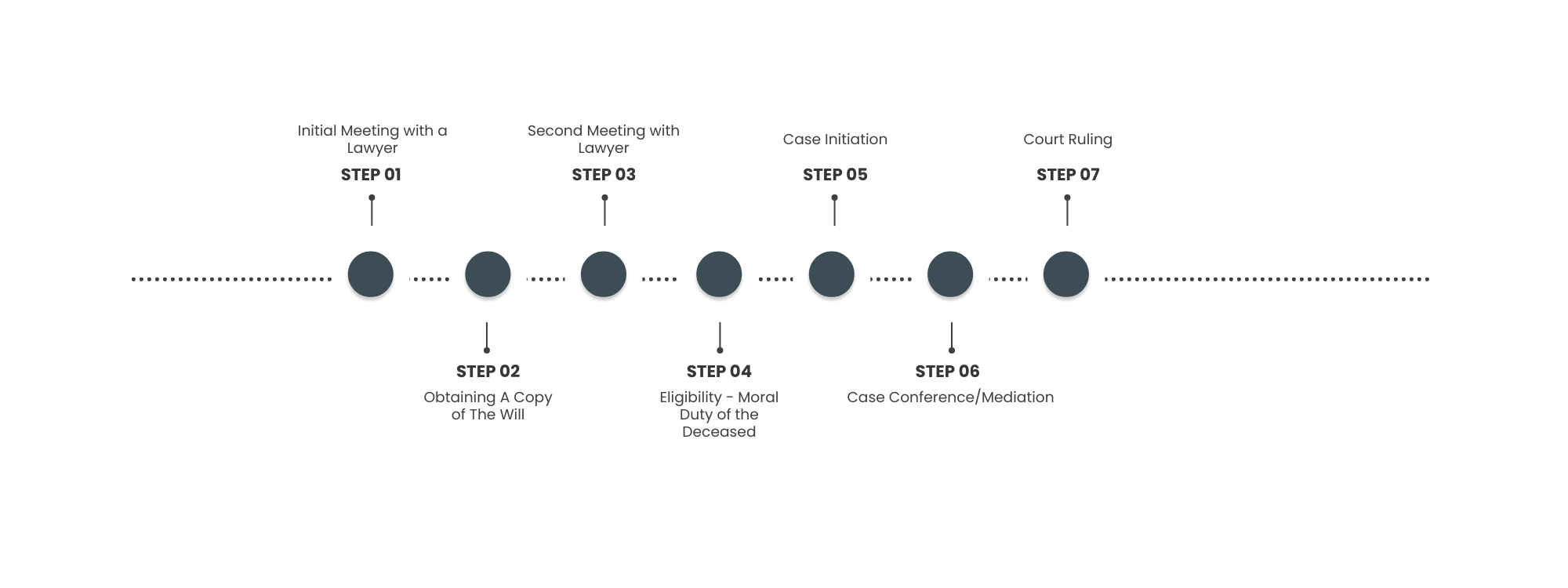Contesting A Will / Part IV Claims
Let us help you navigate the process with our practical, sensitive and expert advice when it comes to contesting a will.
Will Services
Ever wanted to know if you have a leg to stand on when it comes to contesting an Estate?
Generally, a person will make a Will during their lifetime. Their Will directs what is to happen to their Estate (money, property and personal chattels) upon their death.
While a Will is a private document that doesn’t have to be shared with family members or friends before death, it can be changed regularly to reflect the person’s current situation. The consequences of this are that family members (or friends) can often be surprised and/or unsatisfied about the contents of a Will when the person passes away.
It’s, for this reason, the Part IV of the Administration and Probate Act provides an avenue for disgruntled beneficiaries to seek further compensation from a Will and this is commonly referred to and known as contesting a Will.
What Is A Family Provisions Claim?
A family provisions claim, or in legal terms referred to as a Part IV claim, is an application that is made to a Court (either County Court or Supreme Court) for an order that greater provisions be made for the applicant out of the assets of a deceased’s estate.
Put simply, an application is made to a Court to content what you have been left in a deceased person’s Will.
Do I Need A specific Will Lawyer?
In theory, you can attend any law firm and ask them to represent you in a Part IV claim. However, when you engage a lawyer to act for you, you are putting your trust in them to act in your best interests. Therefore, your lawyer should have an intricate knowledge of Part IV of the Administration and Probate Act 1958 (VIC) and the rules surrounding a Part IV claim. If they do not have this knowledge, you risk the claim being unsuccessful and there are no second chances when it comes to this application.
Am I Entitled To Make Part IV Claims?
When a client comes to see us at Canny Legal because they are unsatisfied with the contents of a family member or friends Will, the first question that we need to ask is “are you an eligible person with the meaning of Part IV of the Administration and Probate Act 1958 (VIC) (“the Act”).
The Act sets out several categories, however, the most common are:
- Spouse or domestic partner;
- Children (including adult children);
- Step-children (including adult step-children);
- A registered carer; and
- A person who is in an interdependent relationship with the deceased.
It is not enough for the person to have provided assistance to the deceased during their lifetime (i.e. assisting them with their daily living) or acting as their Power of Attorney. They must be a registered carer.
Some really common examples are nieces and nephews or family friends who assist a deceased person during their lifetime but then are not provided for in their Will. Unfortunately, unless they fall within one of the above categories, they are not entitled to make a claim against the deceased person’s estate. This is where you need a specific Will Lawyer, like the team at Canny Legal who can assist with navigating this for you.
Family Provision Claims FAQS:
Yes, you would need to engage a lawyer to contest a Will. It is a formal Court proceeding and one that requires legal representation.
A person has six months from the date of the Grant of Probate to contest a Will. In some circumstances, an applicant can be granted leave to ‘apply out of time’, but this would only occur if the Estate had not been distributed and there was just cause for the time to be extended.
You are able to advise the Executors that you contest a Will before probate is granted.
However, you are unable to initiate an application with the Court until the Executors have formally been granted Probate and have been given the legal right to act on behalf of the Estate.
No, a person is unable to obtain legal aid to contest a Will.
At the end of the day, the Court will determine who pays the legal costs associated with contesting a Will, and it is incredibly hard for a lawyer to advise a client whether or not their legal costs will be paid from the Estate.
Often when a matter settles at mediation (or case conference), the question of who pays the legal costs are part of the negotiation and determined when any settlement figure is agreed to by all parties.
The Court is unable to make an order for further provisions unless it is satisfied that the applicant has “grounds” to make the claim, which are listed in the Administration and Probate Act 1958 (Vic). The grounds that the Court consider include:
- The applicant must first be an eligible person;
- The applicant was wholly or partially dependent on the deceased for their proper maintenance and support;
- At the time of the deceased’s death, the deceased had a moral duty to provide for the applicant; and
- That the distribution of the deceased’s Will fails to make adequate provision for the applicant’s property maintenance and support.
Simply being a family member of the deceased, or being a ‘boyfriend’ or ‘girlfriend’ does not necessarily give you rights.
On the other hand, there are circumstances where you may be eligible to apply even if you thought you didn’t qualify, which is why it is very important that you see a lawyer as soon as possible if you discover you have not been provided for in a deceased person’s Will.




